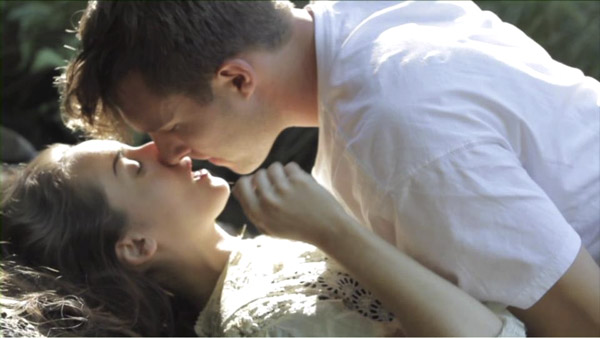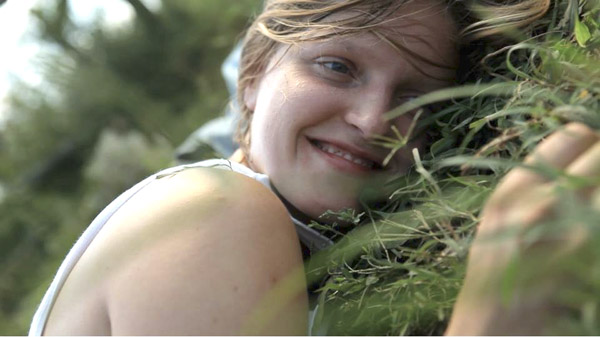Director and writer Josephine Decker’s first two feature-length films complement each other well, while revealing a diverse and unique approach to contemporary filmmaking. Both contain a central, if loose, narrative dream sequence, hallucinations, and odd camera movements and sounds to create completely distinct visions.
Butter on the Latch tells the story of Sarah (Sarah Small) and her friend Isolde (Isolde Chae-Lawrence, in a simultaneously sweet and disturbing performance as an enigmatic best friend). While attending a retreat deep in the forests of Northern California, the two friends reunite after some time. The camp revolves around Balkan music, which is weirdly specific. The sound of the traditional folk music fits with Sarah’s slow dissent into a world of puzzling visions.
Sarah and Isolde’s trip starts out lovely enough, with the friends telling very personal stories and jokes. When Sarah takes a shine to a handsome fellow camper, Steph (Charlie Hewson), things begin to turn south. After Sarah gets both her and Isolde lost at night on the way back to their cabin, their friendship becomes fractious. As the friendship with Isolde falls apart, and as Sarah grows closer to Steph, her reality is hard to grasp, for her and the audience—she dreams of a woman with white hair, haunting the woods, and of nature reaching up around her.
The film revels in the natural world, blurring the lines between the music camp and the forest. Cinematographer Ashley Conner does a magical job, lingering on bugs and sticks and swirling the camera to disorient the viewer. Images are kept closed in; there is no way to visualize the size of the camp. Instead, the spectators’ view is always down towards the ground, at the foot of the forest. It’s a claustrophobic vision, especially as the film turns darker and darker, and a psychological thriller of sorts, though it’s hard to pick up on that until the very end.
In Thou Wast Mild & Lovely, Decker and Conner open their cinematic world up, highlighting sprawling landscapes and the sky. Akin (played by indie film darling Joe Swanberg) is a quiet farmhand, working a summer job away from his wife and child to make extra cash. His employer, Jeremiah (Robert Longstreet), is an aggressive, judgmental man who carries on a relationship with few boundaries with his daughter, Sarah (Sophie Straub). Sarah’s love of the farm and her wild nature draws Akin’s attention, which causes more friction with Jeremiah. The relationships between the farm inhabitants grow even more confusing when Akin’s wife, Drew (Kristin Slaysman), comes to visit.
If Butter on the Latch is a slow burn to an unexpected ending, Thou Wast Mild & Lovely is a firecracker. Sarah’s connection to nature and her sexuality, depicted as on a precipice between girl and woman, drives the narrative in explosive ways. The images of her in particular are extremely voyeuristic. The cinematography here also focuses on nature, but rather than the isolating woods, the camera highlights the volatile relationship between man and land. It’s like an experimental western, at least visually, and calls to mind films like Terrence Malick’s visually stunning Days of Heaven (1978). In one instance, Decker gives the audience a point of view shot of a cow, witnessing the follies of the humans nearby. Additionally, the ending is unpredictable, even if the narrative only hands its spectators bits and pieces of a clear-cut story.
All in all, Decker’s balance of narrative and unusual visuals is extremely affective. Her approach constantly surprises. If you can only see one, however, it would definitely be Thou Wast Mild & Lovely. Butter on the Latch moves much more slowly, but the latter film builds and builds, moving faster and faster, to an unexpected and wild end.


















Leave A Comment